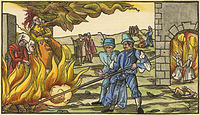
Photo from wikipedia
Abstract In this essay, I argue that any competent group agent must be a wanton. The impetus for this claim is an argument Arthur Applbaum makes in Legitimacy: The Right… Click to show full abstract
Abstract In this essay, I argue that any competent group agent must be a wanton. The impetus for this claim is an argument Arthur Applbaum makes in Legitimacy: The Right to Rule in a Wanton World that a formal institution (in this case, a government) can, under the right conditions, function as a free moral group agent. I begin by explaining Harry Frankfurt’s classic account of wantonism—not just for the benefit of readers who might not be familiar with the concept, but also to emphasize aspects of the concept relevant for the consideration of group agency. I then draw on the contemporary literature on group agency to argue that any successful group agent will be a wanton. I then turn to Applbaum’s account of group agency to argue that his proposed mechanisms for free moral group agency do not successfully overcome the challenge of wantonism. I close the essay by briefly addressing some of the ramifications of my argument for Applbaum’s larger project in Legitimacy. I argue that, after rejecting the flawed account of free moral group agency, we can productively recover some of Applbaum’s key insights within a revised account of political legitimacy.
Journal Title: Moral Philosophy and Politics
Year Published: 2023
Link to full text (if available)
Share on Social Media: Sign Up to like & get
recommendations!